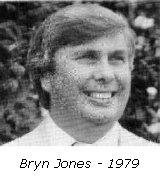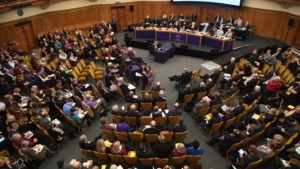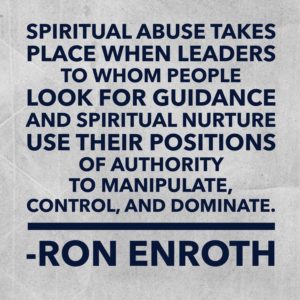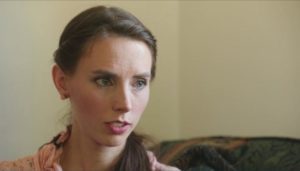 Sally contacted me by email with her account of her Christian journey. This included several exposures to spiritually abusive churches. If anyone still wants to know the meaning of ‘spiritual abuse’ they will find it in this account. Her account has been shortened so that it fits the standard length of the posts on this blog. In the first section which has two parts, Sally tells how she was sucked into membership of a Harvestime Church. The second part will tell the story of how her eyes were opened and she left. Many of the classic ploys used by ‘cultic’ churches can be found in this account. I have left Sally’s own words with minor editing but with some omissions.
Sally contacted me by email with her account of her Christian journey. This included several exposures to spiritually abusive churches. If anyone still wants to know the meaning of ‘spiritual abuse’ they will find it in this account. Her account has been shortened so that it fits the standard length of the posts on this blog. In the first section which has two parts, Sally tells how she was sucked into membership of a Harvestime Church. The second part will tell the story of how her eyes were opened and she left. Many of the classic ploys used by ‘cultic’ churches can be found in this account. I have left Sally’s own words with minor editing but with some omissions.
My own journey into spiritual abuse began when I was living in a large Northern city in the early eighties. I was attending an independent church of excellent reputation at the time which had good teaching and loving and supportive fellowship.
One of my failings, and one with which I still struggle, is having itchy feet. At that time, when living in the large Northern city, I was restless and always on the move, looking for new experiences and new things.
I then began to hear about another church in the city; it appeared very similar to the one I was attending, but better. Looking over the fence, the grass on that side appeared much greener. I decided to pay it a visit.
I was made very welcome and seemed even to be singled out for attention. The worship was vibrant and exciting. Afterwards someone in the congregation invited me to lunch.
I returned to the church the following Sunday and the one after that. Looking back, I now see that there was something magnetic about it, a force that I couldn’t fight and which was increasingly drawing me in. I can only describe it as a magnetic attraction with the emphasis on the latter. I was invited to join the church and told the leaders I wanted to do so.
I was then told that to become a member of the church, I would have to do something they called the Commitment Course. I decided to do this Course so I could go on to join the church. I will refer to this church as SCC.
Having told the leadership of SCC that I wanted to do the Commitment Course and join the church, I was told that I must leave my other church and sever all ties with it. Later that week, I went to see the leader of my old church and his wife in their home and told them that I was leaving because I wanted to join SCC.
The leader his wife shared with me some of their concerns about SCC, including the fact that if you wanted to join a church, you shouldn’t be required to do a Commitment Course. Where is that in the Bible, they asked me? But my mind was made up; I was very stubborn at the time, and if I decided to do something, that was it. My course was set… and I don’t just mean the Commitment Course! Deaf to their pleas, I left.
During the Commitment Course, the importance of what we were told was “covering” was emphasised. It was explained that each of us would need to be submitted to the authority of another more mature church member who would act as our covering. For our spiritual lives to be valid in the sight of God, we had to be under direct submission to this person. We were not only accountable to God, we were told, but also to our leaders and elders.
After having finished the Commitment Course, I was assigned to a married woman in the fellowship, whom I was told was my “shepherd”. She herself had a shepherd, another married woman, and this woman had as her shepherd, the leader’s wife, CT. My shepherd, whom I shall refer to as F, became my intercessor and substitute for God. I was told I could not go directly to God; I could only go to F, my shepherd. She, in turn, could consult her shepherd for further counsel, and if her shepherd, having been consulted, felt that even more counsel was needed, would go to CT. CT’s husband, KT, was the leader and pastor of SCC.
I was required to meet with F, my shepherd, on a regular basis, at least once a week. She would come and visit me, or I would go and visit her. She always wanted to discuss (or I can now say with hindsight, probe) – every area of my life. I was encouraged to withhold nothing from her.
At first I saw this as genuine and loving concern, though later, it began to develop threatening overtones. However, being anxious not to be accused of not being submissive enough or even rebellious, I quickly quelled these thoughts and discussed them with no-one. This, in any case, would have been difficult, as relationships outside the church were discouraged, subtly and not so subtly, and I found myself being slowly but surely isolated from friends and contacts, especially those in the church I had left to join SCC. Strangely enough, SCC had much less of a problem with my non-Christian friends as they did with my Christian ones; I think perhaps they were seen as less of a threat.
The hierarchical structure of this church was like a pyramid, with people ascending in order of rank until the top echelon was reached. Our church was part of the Harvestime/Restorationist group of churches in the North of England based at Church House, Bradford and overseen by Bryn Jones, who exercised an apostolic role.
It was stated during the Commitment Course (to which we all had to agree and later sign as a condition of membership of SCC) that we were willing for the leadership to have entry to every part of our lives that may need adjustment. I signed this form, as did my fellow participants, on completion of the Commitment Course.
The Harvestime group of churches had a magazine called Restoration, which stated, “Restoration magazine exists as a prophetic voice to the people of God, calling us back to NT principles and on to God’s full purpose for His church”.
Looking back now, I wonder how I could have believed what Restorationism taught, but believe it I did, and what is more, vigorously defended its teachings to any who opposed them, some of whom were my friends.
Like many members of the group of Northern Harvestime churches under the umbrella of Bradford and Bryn Jones and his fellow band of apostles and prophets, I developed a sort of spiritual superiority, thinking that other churches and Christians who were not part of us or of Restorationism in general were somehow lacking and far behind ourselves in understanding God’s true purposes. The Restorationist churches also had a strong emphasis on tithing, and we were all required to tithe a tenth of our income each week, including those of us who received social security payments as they were known then; nowadays, they are called benefits. We were also required to give extra money for special needs and missions.
As time went by, my life was increasingly taken over by SCC and its various activities; attending Sunday service, going to a home group, visits from my shepherd F, my visiting F, and visits from F’s shepherd, and her shepherd, the pastor’s wife CT. I wasn’t working at the time, so helped members of the fellowship with chores such as cleaning and shopping. This was not a voluntary activity; it was one required of all the members, especially the single ones; the single men in the church would clean the leaders’ cars or do their gardening, while the single women babysat, cleaned and shopped for the leaders’ wives.
SCC dominated my life. I could not make a decision, large or small, without being required to discuss it with my shepherd, F, and receive her counsel and advice, or the counsel and advice of those above her. There was constant interference in the way that I was bringing up my daughter. I was increasingly being told that this or that thing was wrong, and I was sometimes told off so harshly by various leaders that I was reduced to tears. Dissent and disagreement were not allowed, though, so I bit my lip and did as I was told.
Part two of the first section of Sally’s story Disillusionment and Departure will follow in a few days




